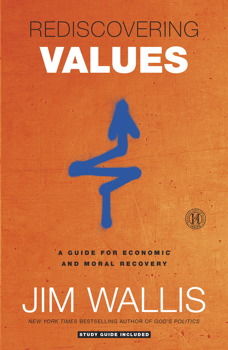Jim Wallis: Rediscovering Values

Cover from the February 2011 revised edition.
Jim Wallis, Rediscovering Values On Wall Street, Main Street, and Your Street: A Moral Compass for the New Economy (New York, NY: Howard Books, 2010), ix + 255 pages, ISBN 9781439183120.
Rahm Emanuel, President Obama’s former chief of staff, was quoted as saying, “You don’t ever want to let a crisis go to waste; it’s an opportunity to do important things that you would otherwise avoid.” Jim Wallis is founder and CEO of Sojourners as well as editor-in-chief of Sojourners magazine; evangelical ministries promoting social justice. In his recent book, Rediscovering Values On Wall Street, Main Street, and Your Street: A Moral Compass for the New Economy he writes that the current economic crisis is a “transformative moment in history,” one where all Americans have an unprecedented opportunity to make fundamental and, hopefully, long-lasting changes that are not just economic and political, but moral as well. It appears that Wallis is as pragmatic as Emanuel.
Jim Wallis is also the author of recent bestsellers, including The Great Awakening: Reviving Faith and Politics in a Post-Religious Right America (2008) and God’s Politics: Why the Right Gets It Wrong and the Left Doesn’t Get It (2006). Along with other writers such as David P. Gushee, author of The Future of Faith in American Politics: Witness of the Evangelical Center (2008), and sociologist James Davison Hunter in his recent book To Change the World (Oxford University Press, 2010), Wallis touches the ideological nerve center of the majority of American people and Christians. To one degree or another, they all advocate the reformation of the large ideological, political, and even spiritual center, moving away from the polarization between Left and Right.
For Wallis, the current economic crisis is the point where the social and spiritual combine to set the stage for combating not only the economic ills brought about by the crisis, but also to offer an opportunity to resurrect the human spirit: a spirit of compassion, creativity, community development and empowerment, and plain old neighbors helping neighbors. It is here at this crux that Wallis sees an opportunity for the wheels of political action, spiritual unity, and social justice to roll into high gear. He examines all three in Rediscovering Values.
Instead of asking, “When will this crisis be over?” Wallis says we should ask, “How will this crisis change us?”
Wallis contends that the more important question revolves around our moral compass, a compass that registers the direction of our moral deficit and shows the way toward our moral recovery. But this moral recovery is impossible if clergy, politicians, media and others continually ask the wrong question. “If we start with the wrong question, it doesn’t matter how good our answer is, we’ll always end up in the wrong place. If we only ask how to get back to the place we were before this crisis began, we will miss the opportunity to stop walking in circles and start moving forward” (6). For Wallis, then, the real question—“How will this crisis change us?”—goes to the moral and spiritual heart of social justice; a concept that the evangelical Left touts as its theological and ideological mantra.
Category: Living the Faith, Winter 2011


